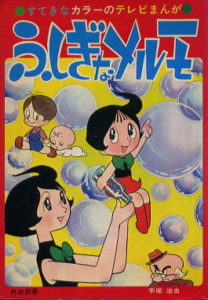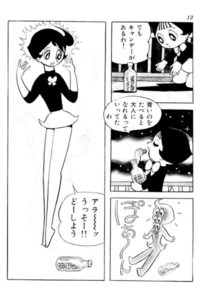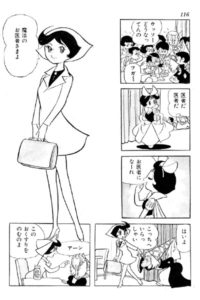Marvellous Melmo, The (Manga)
Also known as ふしぎなメルモ (Fushigi na Merumo)
| English Title: | The Marvelous Melmo |
| In English? | No |
| Japanese Title: | ふしぎなメルモ Fushigi na Merumo |
| Type: | Chapter Serial |
| Original run: | 1970/09 – 1972/04 1971/05 – 1972/04 |
| Published in: | First Grader 小学一年生 Good Child よいこ |
| Published by: | Shogakukan |
| Volumes: | 1 MT-280 |
Tezuka’s adventures of a child disguised in the body of an adult, The Marvelous Melmo (1970-72), began its serialization in First Grader in September 1970. The feature proved popular enough that in May 1971 it also began appearing in a sister-magazine known as Good Child, and would continue running in both until the series came to a close in March 1972. Originally known as Mama-chan, the series’ name was changed in October 1971 due to a difficulty in securing a trademark.
What it’s about
When her mother unexpectedly dies in a car accident, a precocious little girl named Melmo and her mischievous little brother Totoo are suddenly orphaned. Deeply concerned about the two young children she has left behind on Earth, Melmo’s mother pleads with God to help them. Touched by the mother’s love, God gives Melmo a marvelous gift – a jar full of magic candies.
By eating one of the blue candies, Melmo is able to physically (but not mentally) age herself ten years, by eating one of the red ones, she is able to reverse the process and make herself ten years younger. In the hands of a girl about 10 years old, this gives her the ability to physically transform herself from an infant to a young adult and back again. So, armed with her endless jar of magic candies, Melmo sets off to explore the adult world through the eyes of a child.
With her brother Totoo helping get her both into and out of trouble, and a couple of angels – disguised as a mouse and a frog – trying to keep an eye on her, Melmo gets to experience a slice of adult life through a variety of careers, including a nurse, a schoolteacher, a policewoman, and more!
What you should know
One of Tezuka’s strengths as a manga artist was his interest in just about everything and anything. In fact, it is one of the biggest reasons for the sheer diversity of his works. Besides being well-read in literature, and well-viewed in film, he was also extremely cognizant of current socio-political trends – and he used all three to create some great manga works.
In the late 1960’s children’s sex education was a heated topic of discussion in Japan. Despite the misgivings of many adults, this led to more provocative material being published in manga aimed at children. For Tezuka though, who was still seen at the time as being primarily a children’s manga artist, this was a great opportunity to do things a little different.
His response is now informally referred to as a “sex education trilogy” of sorts. While both Apollo’s Song (1970) and Yaketpachi’s Maria (1970-71) tackle the theme a little bit more head on – with a trip down the reproductive tubes for example – The Marvelous Melmo takes a bit more subtle approach. Tezuka always believed his readers, even his very young ones, deserved his honesty and respect. So instead of trying to gloss over the sex, he simply focused on the education and saw an opportunity to teach young girls about adult issues – such as menstruation and the dangers of sexual harassment – while being entertained at the same time.
And so, Tezuka’s little girl Melmo and her magic bottle of pills was born… well sort of.
When it was launched in First Grader in September 1970, both the series and its titular star were known as Mamaa-chan – presumably as a reference to the young girl being a kind of “little mama” to her brother and their friends – and that’s the way it would stay for the entire first year of publication. However, when production on the animated television series began, it was discovered that “Mamaa-chan” was already a registered trademark and therefore not available. Suddenly in need of a new name, Tezuka struck upon “Melmo” as a derivative of the English word “metamorphose” which fit perfectly with the magic candy plot device. And so, the series was permanently renamed The Marvelous Melmo beginning with the October 1971 issues of both First Grader and Good Child.
Finally, it should be noted that although The Marvelous Melmo feature also appeared in Tezuka Magazine Leo, since that version was managed mainly by Tezuka Productions staff rather than Tezuka himself, it is usually not considered part of Tezuka’s manga catalogue.






